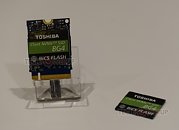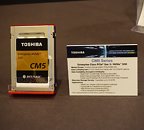Wednesday, January 9th 2019

Toshiba Shows Off 96-Layer BiCS FLASH Alongside Plethora of Enterprise SSDs at CES 2019
During our visit with Toshiba at CES 2019, we were shown not only new technologies that they will be rapidly deploying but a large number of SSDs for various market segments. The biggest draw was their 96-layer BiCS Flash with 4-bit-per-cell quadruple-level cell (QLC) technology. Toshiba is now pushing the boundary for capacity as a single chip device can reach 1.33 Tb (Terabits) while a single package device with 16-dies stacked architecture can reach 2.66 TB. That said, they are already sampling their 1 TB NVMe single package BG4 series SSDs to PC OEM customers in limited quantities.
These latest drives with their new BiCS FLASH technology incorporate everything into a tiny SSD that offers class-leading storage with sequential read performance reaching up to 2250 MB/s. Random read performance can also hit exceptional levels reaching up to 380,000 IOPS. For now, these BG4 based drives are targeted at ultra-thin PC notebooks, IoT embedded systems and will be made available in four capacities including; 128 GB, 256 GB, 512 GB and finally 1 TB. To meet expected demand, Toshiba will also be opening a facility in Japan dedicated to this latest technology in order to bring even higher capacities per NAND module.Also on display were numerous enterprise-focused SSDs including the CM5, RM5, PM5, CD5, HK6-DC and XD5 series of drives. The CM5 is an enterprise-class PCIe Gen 3 NVMe SSD utilizing the 2.5-inch U.2 form factor. Data Availability consists of Single Port 1x4 and Dual Port 2x2 in the same device, while encryption consists of ISE (Instant Secure Erase), TCG Opal and FIPS 140-2. As it is an enterprise-class drive, it also has PLP (Power-Loss-Protection) and end-to-end data protection. It offers storage capacities of up to 15.36 TB and is meant for mixed-use, mission-critical workloads such as Hyperscale and virtualized environments, HPC (Higher Performance Computing) and OLTP (Online Transaction Procession).The RM5 which will be available in capacities up to 7.68 TB and is considered s a single port value SAS SSD by Toshiba. It features a 2.5 million hour MTTF rating and offers consistent performance, latency and reliability for 24/7 environments. Its also considered ideal for server-attached applications that can utilize more performance than traditional SATA 6Gb/s drives can deliver.Taking a look at the PM5, this SSD utilizes the SAS (12Gbps) interface and is Toshiba's 5th generation of SAS SSDs. Packaged in the standard 2.5-inch form factor, it features dual-port, ISE, TCG Enterprise and FIPS 140-2 in regards to data availability and encryption. Integrity options consist of PLP and end-to-end data protection. The PM5 SSD is targeted at OLTP, databases, e-commerce and Financial workloads including HFT (high-frequency trading).The CD5 series, on the other hand, is a Data Center class PCIe Gen 3 NVMe U.2 SSD and is specifically meant for read-intensive workloads. Capacity tops out at 7.68 TB with the drive delivering consistent performance for public and private cloud infrastructure. It offers sequential read speeds of 3140 MB/s and sequential write speeds of up to 1980 MB/s depending upon total capacity. Meanwhile, the HK6-DC series is a standard SATA SSD in the 2.5-inch form factor. Storage space tops out at 4 TB for these SSDs with the drive also being targeting at public and private cloud infrastructure. However, due to the standard SATA interface sequential read and write speeds top out at 550 MB/s and 530 MB/s respectively with write speeds dependent on the capacity.They also had the XD5 series on hand as well which is a PCIe NVMe M.2 SSD where its compact size makes it suitable for ultra-high density deployments. It too is targeted at dealing with read-intensive workloads and is meant for public and private cloud infrastructure much like the HK6-DC and CD5 SSDs it offers sequential read and write speeds of 2700 MB/s and 895 MB/s with write speeds depending on capacity.
These latest drives with their new BiCS FLASH technology incorporate everything into a tiny SSD that offers class-leading storage with sequential read performance reaching up to 2250 MB/s. Random read performance can also hit exceptional levels reaching up to 380,000 IOPS. For now, these BG4 based drives are targeted at ultra-thin PC notebooks, IoT embedded systems and will be made available in four capacities including; 128 GB, 256 GB, 512 GB and finally 1 TB. To meet expected demand, Toshiba will also be opening a facility in Japan dedicated to this latest technology in order to bring even higher capacities per NAND module.Also on display were numerous enterprise-focused SSDs including the CM5, RM5, PM5, CD5, HK6-DC and XD5 series of drives. The CM5 is an enterprise-class PCIe Gen 3 NVMe SSD utilizing the 2.5-inch U.2 form factor. Data Availability consists of Single Port 1x4 and Dual Port 2x2 in the same device, while encryption consists of ISE (Instant Secure Erase), TCG Opal and FIPS 140-2. As it is an enterprise-class drive, it also has PLP (Power-Loss-Protection) and end-to-end data protection. It offers storage capacities of up to 15.36 TB and is meant for mixed-use, mission-critical workloads such as Hyperscale and virtualized environments, HPC (Higher Performance Computing) and OLTP (Online Transaction Procession).The RM5 which will be available in capacities up to 7.68 TB and is considered s a single port value SAS SSD by Toshiba. It features a 2.5 million hour MTTF rating and offers consistent performance, latency and reliability for 24/7 environments. Its also considered ideal for server-attached applications that can utilize more performance than traditional SATA 6Gb/s drives can deliver.Taking a look at the PM5, this SSD utilizes the SAS (12Gbps) interface and is Toshiba's 5th generation of SAS SSDs. Packaged in the standard 2.5-inch form factor, it features dual-port, ISE, TCG Enterprise and FIPS 140-2 in regards to data availability and encryption. Integrity options consist of PLP and end-to-end data protection. The PM5 SSD is targeted at OLTP, databases, e-commerce and Financial workloads including HFT (high-frequency trading).The CD5 series, on the other hand, is a Data Center class PCIe Gen 3 NVMe U.2 SSD and is specifically meant for read-intensive workloads. Capacity tops out at 7.68 TB with the drive delivering consistent performance for public and private cloud infrastructure. It offers sequential read speeds of 3140 MB/s and sequential write speeds of up to 1980 MB/s depending upon total capacity. Meanwhile, the HK6-DC series is a standard SATA SSD in the 2.5-inch form factor. Storage space tops out at 4 TB for these SSDs with the drive also being targeting at public and private cloud infrastructure. However, due to the standard SATA interface sequential read and write speeds top out at 550 MB/s and 530 MB/s respectively with write speeds dependent on the capacity.They also had the XD5 series on hand as well which is a PCIe NVMe M.2 SSD where its compact size makes it suitable for ultra-high density deployments. It too is targeted at dealing with read-intensive workloads and is meant for public and private cloud infrastructure much like the HK6-DC and CD5 SSDs it offers sequential read and write speeds of 2700 MB/s and 895 MB/s with write speeds depending on capacity.












Comments on Toshiba Shows Off 96-Layer BiCS FLASH Alongside Plethora of Enterprise SSDs at CES 2019
There are no comments yet.